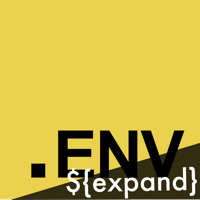$ gnpm install dotenv-expand
Dotenv libraries are supported by the community.
Special thanks to:


dotenv-expand

Dotenv-expand adds variable expansion on top of dotenv. If you find yourself needing to expand environment variables already existing on your machine, then dotenv-expand is your tool.
Install
# Install locally (recommended)
npm install dotenv-expand --save
Or installing with yarn? yarn add dotenv-expand
Usage
Create a .env file in the root of your project:
PASSWORD="s1mpl3"
DB_PASS=$PASSWORD
As early as possible in your application, import and configure dotenv and then expand dotenv:
var dotenv = require('dotenv')
var dotenvExpand = require('dotenv-expand')
var myEnv = dotenv.config()
dotenvExpand.expand(myEnv)
console.log(process.env)
That's it. process.env now has the expanded keys and values you defined in your .env file.
Preload
You can use the --require (-r) command line option to preload dotenv & dotenv-expand. By doing this, you do not need to require and load dotenv or dotenv-expand in your application code. This is the preferred approach when using import instead of require.
$ node -r dotenv-expand/config your_script.js
The configuration options below are supported as command line arguments in the format dotenv_config_<option>=value
$ node -r dotenv-expand/config your_script.js dotenv_config_path=/custom/path/to/your/env/vars
Additionally, you can use environment variables to set configuration options. Command line arguments will precede these.
$ DOTENV_CONFIG_<OPTION>=value node -r dotenv-expand/config your_script.js
$ DOTENV_CONFIG_ENCODING=latin1 node -r dotenv-expand/config your_script.js dotenv_config_path=/custom/path/to/.env
Examples
See tests/.env for simple and complex examples of variable expansion in your .env
file.
Documentation
DotenvExpand exposes one function:
- expand
Expand
expand will expand your environment variables.
const dotenv = {
parsed: {
BASIC: 'basic',
BASIC_EXPAND: '${BASIC}',
BASIC_EXPAND_SIMPLE: '$BASIC'
}
}
const obj = dotenvExpand.expand(dotenv)
console.log(obj)
Options
ignoreProcessEnv
Default: false
Turn off writing to process.env.
const dotenv = {
ignoreProcessEnv: true,
parsed: {
SHOULD_NOT_EXIST: 'testing'
}
}
const obj = dotenvExpand.expand(dotenv).parsed
console.log(obj.SHOULD_NOT_EXIST) // testing
console.log(process.env.SHOULD_NOT_EXIST) // undefined
FAQ
What rules does the expansion engine follow?
The expansion engine roughly has the following rules:
$KEYwill expand any env with the nameKEY${KEY}will expand any env with the nameKEY\$KEYwill escape the$KEYrather than expand${KEY:-default}will first attempt to expand any env with the nameKEY. If not one, then it will returndefault
You can see a full list of examples here.
Contributing Guide
See CONTRIBUTING.md
CHANGELOG
See CHANGELOG.md
Who's using dotenv-expand?
These npm modules depend on it.
Current Tags
- 10.0.0 ... latest (3 years ago)
16 Versions
- 10.0.0 ... 3 years ago
- 9.0.0 ... 3 years ago
- 8.0.3 ... 4 years ago
- 8.0.2 ... 4 years ago
- 8.0.1 ... 4 years ago
- 8.0.0 ... 4 years ago
- 7.0.0 ... 4 years ago
- 6.0.1 ... 4 years ago
- 6.0.0 ... 4 years ago
- 5.1.0 ... 7 years ago
- 5.0.0 ... 7 years ago
- 4.2.0 ... 8 years ago
- 4.1.0 ... 8 years ago
- 4.0.1 ... 9 years ago
- 4.0.0 ... 9 years ago
- 0.1.0 ... 10 years ago
- @hapi/lab ^24.5.1
- @types/node ^17.0.8
- dotenv 16.0.3
- lab ^14.3.4
- should ^11.2.1
- standard ^16.0.4
- typescript ^4.5.4



